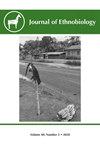云南诺苏园艺师对野生食用植物和真菌的地方知识及其社会经济意义
IF 1.3
3区 社会学
Q1 ANTHROPOLOGY
引用次数: 0
摘要
摘要野生可食用植物(WEP)和真菌的采集和消费是世界各地许多人口饮食方式的重要组成部分。WEP和真菌知识被认为是传统生态知识的重要组成部分,并受到社会、经济、政治和文化背景和变化的巨大影响。他的研究展示了更传统的村庄和政府促进核桃生产计划中的村庄之间的自然主义比较。我们记录了云南省西北部一个诺苏族乡的WEP和真菌的民族物种,并分析了相应的社会经济影响。数据收集和数据分析采用了半结构化访谈、免费名单、家庭调查和文化共识分析。我们记录了139种WEP和真菌的民族物种,一致性分析表明,文化一致性模型与诺苏人对WEP和霉菌的了解非常吻合。定量分析表明,性别对当地对WEP和真菌的了解没有影响,不同类型的村庄和收集WEP和霉菌所需的旅行时间与能力得分无关。然而,WEP和真菌的能力得分与性别和旅行时间之间的相关性显示出中等的影响大小。年龄在研究乡镇诺苏人对WEP和真菌的了解中起着重要作用,表明年龄越大,他们的得分越高。本文阐述了诺苏人关于WEP和真菌的传统知识的困境和现实,揭示了由于社会、经济和生态的变化,传统知识正在逐渐发生变化的趋势。本文章由计算机程序翻译,如有差异,请以英文原文为准。
Nuosu Horticulturalists' Local Knowledge of Wild Edible Plants and Fungi and Socio-Economic Implications in Yunnan, Southwest China
Abstract. The collection and consumption of wild edible plants (WEPs) and fungi is an important part of the foodways of many populations worldwide. Knowledge of WEPs and fungi is considered a significant component of traditional ecological knowledge (TEK), and is greatly impacted by social, economic, political, and cultural contexts and changes. T his study showcases a naturalistic comparison between more traditional villages and villages that were part of a government program to promote walnut production. We document the ethno-species of WEPs and fungi and analyze the corresponding socio-economic implications in an ethnic Nuosu township in the northwest region of Yunnan Province, China. Semi-structured interviews, free lists, household surveys, and cultural consensus analysis were used for data collection and data analysis. We recorded 139 ethno-species of WEPs and fungi, and consensus analysis indicates a good fit of the cultural consensus model with respect to Nuosu people's knowledge on WEPs and fungi. Quantitative analysis shows gender does not have an effect on local knowledge of WEPs and fungi, and different types of villages and travel-time required to collect WEPs and fungi are not correlated with competence scores. However, the correlation between competence scores of WEPs and fungi with gender and travel time show moderate effect-sizes. Age plays an important role in knowledge of WEPs and fungi among Nuosu people in the study township, showing that the older the person, the higher their score. This article illustrates the plight and reality of traditional knowledge about WEPs and fungi of the Nuosu people, revealing a trend that traditional knowledge is gradually changing due to social, economic, and ecological changes.
求助全文
通过发布文献求助,成功后即可免费获取论文全文。
去求助
来源期刊

Journal of Ethnobiology
Social Sciences-Anthropology
CiteScore
4.80
自引率
3.40%
发文量
21
审稿时长
>12 weeks
期刊介绍:
JoE’s readership is as wide and diverse as ethnobiology itself, with readers spanning from both the natural and social sciences. Not surprisingly, a glance at the papers published in the Journal reveals the depth and breadth of topics, extending from studies in archaeology and the origins of agriculture, to folk classification systems, to food composition, plants, birds, mammals, fungi and everything in between.
Research areas published in JoE include but are not limited to neo- and paleo-ethnobiology, zooarchaeology, ethnobotany, ethnozoology, ethnopharmacology, ethnoecology, linguistic ethnobiology, human paleoecology, and many other related fields of study within anthropology and biology, such as taxonomy, conservation biology, ethnography, political ecology, and cognitive and cultural anthropology.
JoE does not limit itself to a single perspective, approach or discipline, but seeks to represent the full spectrum and wide diversity of the field of ethnobiology, including cognitive, symbolic, linguistic, ecological, and economic aspects of human interactions with our living world. Articles that significantly advance ethnobiological theory and/or methodology are particularly welcome, as well as studies bridging across disciplines and knowledge systems. JoE does not publish uncontextualized data such as species lists; appropriate submissions must elaborate on the ethnobiological context of findings.
 求助内容:
求助内容: 应助结果提醒方式:
应助结果提醒方式:


